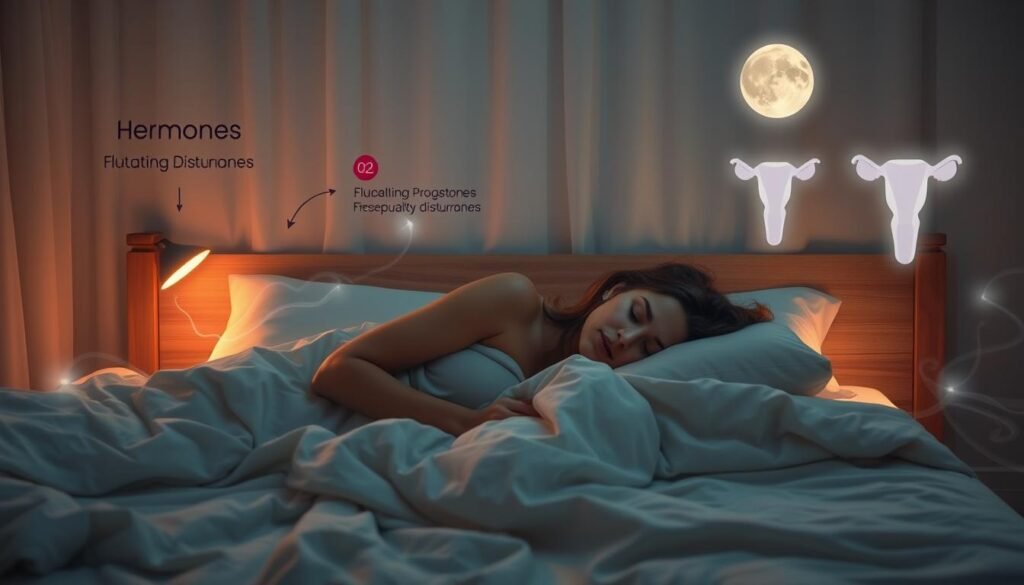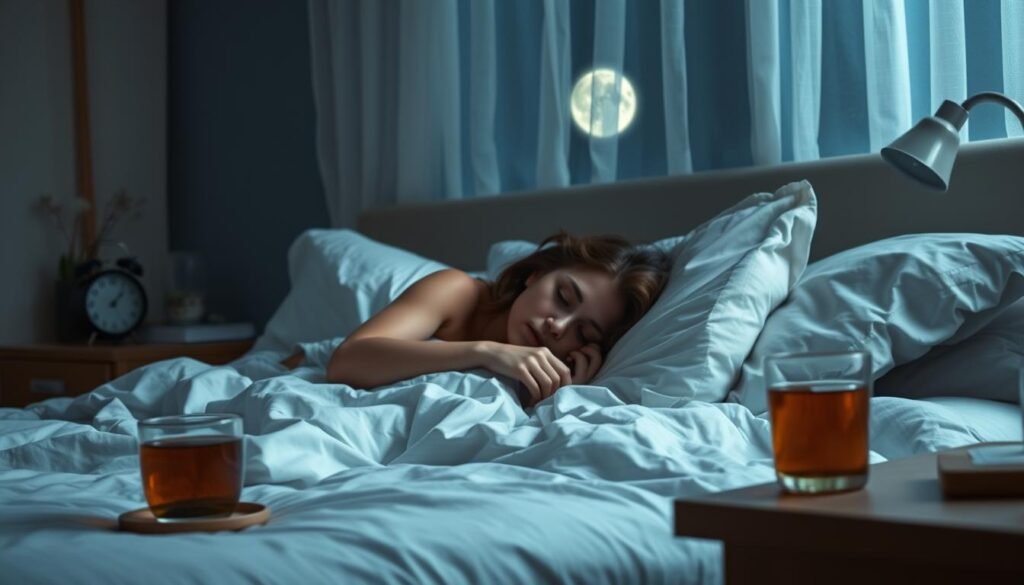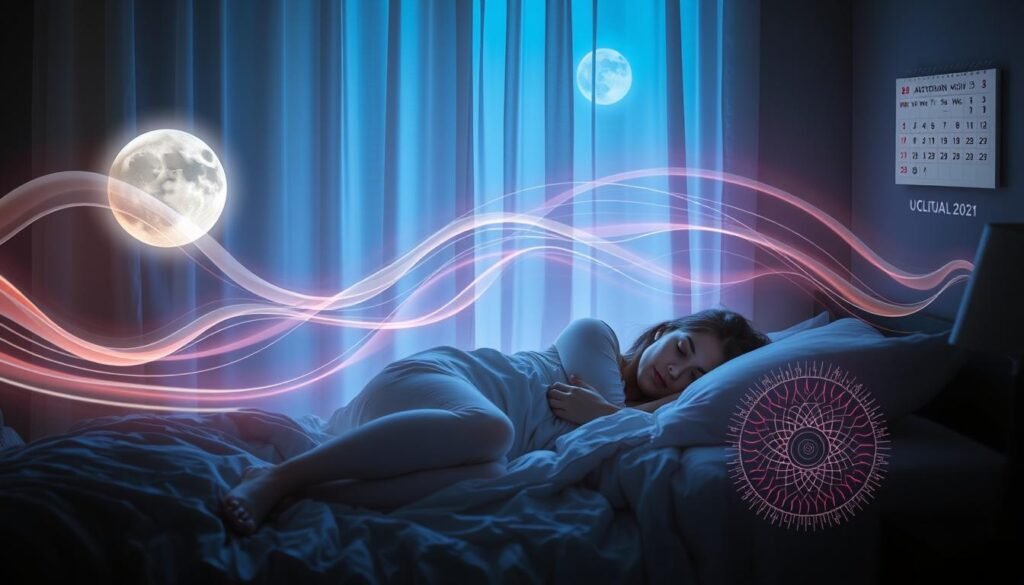Up to 70% of women with premenstrual dysphoric disorder (PMDD) face insomnia before their period starts. This often goes unnoticed. Each phase of the menstrual cycle can change sleep quality because of hormonal shifts. For many, insomnia isn’t just a small problem. It causes daytime tiredness and impacts overall health. Almost 90% of people who menstruate suffer from premenstrual syndrome (PMS). Many of them have trouble sleeping at different times in their cycle.
Understanding the link between sleep and the menstrual cycle is key for better sleep and health. When we explore how hormonal changes affect sleep, it’s clear that fixing insomnia during ovulation helps. This can lead to improved sleep and less menstrual issues.
Key Takeaways
- Insomnia during ovulation is linked to hormonal fluctuations.
- Up to 70% of women with PMDD experience sleep issues.
- Over 90% of menstruators deal with some level of PMS.
- Understanding sleep patterns can aid in dealing with sleep disorders.
- Practicing good sleep hygiene can improve sleep quality.
- Hormones such as estrogen and progesterone significantly influence sleep.
Understanding Insomnia and the Menstrual Cycle
Insomnia means you might find it hard to fall asleep or stay asleep. It can also mean you don’t sleep well. The menstrual cycle can change how you sleep, especially when your hormones go up and down. During certain times of the month, some women find it harder to sleep well. This is often because of PMS symptoms getting worse.
Before your period starts, you might sleep poorly because of changes in estrogen and progesterone. These changes can mess with how well you sleep. About 38% of pregnancies see these sleep issues too, showing how big an impact hormones have. When women reach perimenopause, up to 47% of them might find it hard to sleep.
Some studies link high estrogen during ovulation to better sleep. This could be why you sleep well at this time. But, working out too hard close to bedtime might make it harder to sleep. This is especially true if you’re already feeling PMS symptoms.
Research from both 2016 and 2023 shares important insights. It shows sleep gets worse during the luteal phase, which affects your sleep deeply. It’s key to understand this to improve sleep health and manage period insomnia.
| Study Year | Findings |
|---|---|
| 2016 | Periods affect stage two and REM sleep due to hormonal fluctuations. |
| 2018 | PMS increases the likelihood of insomnia and low sleep quality. |
| 2023 | Period insomnia categorized into satisfaction of sleep, alertness, efficiency, and duration. |
What Hormonal Changes Occur During Ovulation?
Various hormonal changes ovulation influence a woman’s well-being during her menstrual cycle. Ovulation usually happens on the 14th day of a 28-day cycle. At this stage, estrogen levels peak, readying the endometrial lining for a potential pregnancy.
After estrogen peaks, progesterone levels go up during the luteal phase. This prepares the body for a possible embryo to implant.
The balance between estrogen and progesterone can affect energy and health. Lower melatonin may lead to sleep issues. When menstruation approaches, estrogen and progesterone decrease, causing tiredness.
Many women feel tired because of these hormone changes during ovulation. This ovulation fatigue can worsen with stress, poor diet, and no exercise. Though it doesn’t affect fertility directly, fatigue may point to other health issues.
| Phase | Duration | Key Hormones | Effects on Body |
|---|---|---|---|
| Follicular Phase | Approximately 14 days | Increasing Estrogen | Thickening of uterine lining |
| Ovulation | 1 day | Peak Estrogen | Release of an egg |
| Luteal Phase | Approximately 14 days | Progesterone increases | Preparation for potential pregnancy |
| Menstrual Phase | 3 to 7 days | Decrease in Estrogen and Progesterone | Shedding of the uterine lining |
The hormone changes during the menstrual cycle, especially ovulation, can affect sleep and energy. Knowing about these menstrual irregularities helps understand their impact on daily life.
Insomnia Ovulation: A Closer Look at Sleep Disruptions
Women often struggle with sleep problems during ovulation. This time can bring insomnia, causing nights full of tossing and turning. Changes in hormones are mainly responsible. Specifically, shifts in progesterone can change sleep patterns, reducing deep sleep and increasing lighter sleep stages. This can make it hard to get quality rest.
Also, body temperatures rise in the luteal phase, disrupting natural sleep cycles. These shifts can make sleeping well difficult as the menstrual cycle moves forward. Studies have found that good sleep is crucial for both our daily well-being and fertility. Not getting enough sleep can lead to fertility issues, making it even tougher for women wishing to conceive.
Many women might not understand the impact of sleep disruptions on their reproductive health. It’s important to know how ovulation-related insomnia affects fertility. Improving sleep quality is vital for bettering conception odds. Recent research suggests that bad sleep can seriously affect fertility efforts.
The Role of Estrogen and Progesterone in Sleep Quality
Understanding the influence of estrogen and progesterone on sleep is key. They significantly impact menstrual cycles and sleep health. For many, these hormonal changes shape how well they sleep, sometimes causing insomnia.
Impact of Hormonal Fluctuations on Sleep Patterns
Estrogen helps with deep, restful sleep. But, before menstruation, a drop in estrogen levels can lead to more insomnia. In times like pregnancy or menopause, women have a higher chance of facing sleep problems. Learning about estrogen and progesterone’s effect on sleep is crucial for finding ways to cope.
Understanding Thyroid Function and Sleep
Thyroid hormones are also vital for good sleep. An imbalance can make sleep issues worse, adding to women’s challenges. This is especially true during menopause, when progesterone levels drop. Knowing about these hormonal effects is important for better sleep management and tackling menstrual problems.

| Hormone | Effect on Sleep | Notes |
|---|---|---|
| Estrogen | Promotes restorative sleep | Declines before menstruation |
| Progesterone | May induce sleepiness | Can lead to insomnia and sleep apnea in low levels |
| Thyroid Hormones | Regulates metabolism, impacting overall sleep | Imbalances can worsen sleep disorders |
Effects of Sleep Deprivation on Fertility
Sleep and fertility are closely linked, especially for women wanting to get pregnant. Poor sleep can mess with hormone levels and how the ovaries work. These are key for having a baby. Getting enough good sleep helps keep everything right for ovulation and periods.
Relationship Between Sleep Quality and Ovarian Function
Sleeping less than seven hours can lower your chances of getting pregnant. Studies show that not sleeping enough reduces fertility. It messes with ovarian function and the menstrual cycle. Not sleeping well can stop hormones from changing as they should, making it harder to conceive.
How Chronic Insomnia Can Affect Reproductive Health
Women with long-term insomnia often need help because it really affects having a baby. One in three women who can’t get pregnant say they don’t sleep well. Bad sleep means you might have a harder time getting pregnant. This shows how important handling sleep problems is for women trying to have a baby.
Common Symptoms of Insomnia During Ovulation
Many women have trouble sleeping during ovulation. They find it hard to fall and stay asleep. This leads to waking up feeling unrested and contributes to poor sleep quality over time.
Heightened irritability and anxiety are also common. Difficulty concentrating can interfere with daily activities. These issues get worse due to emotional and physical discomfort from PMS signs. Stress and anxiety-prone behaviors often follow.
About 70% of women with PMDD have sleep issues before their period starts. This shows a clear link between sleep problems and the menstrual cycle. Knowing this connection is crucial for those affected.

To fight these symptoms, proactive measures are necessary. Adopting a healthy lifestyle, with regular exercise and stress management, helps. For more on preventing insomnia, click here.
| Symptom | Prevalence |
|---|---|
| Trouble falling asleep | 70% |
| Waking up tired | 66% |
| Increased anxiety | 70% |
| Difficulties concentrating | Unspecified |
| Increased irritability | Unspecified |
Solutions for Restless Nights Related to Ovulation Timing
Many find it hard to sleep well during ovulation. Adopting good sleep habits and trying natural sleep aids for fertility can help a lot. A relaxing routine before bed and a comfy sleep setting make a big difference.
Effective Sleep Hygiene Practices
Good sleep habits are key to beating insomnia. Important steps include:
- Sticking to a regular sleep schedule helps set your body’s clock.
- Having a calming bedtime routine, like reading or meditation, helps you unwind.
- Make sure your bedroom is dark, quiet, and cool for sleeping.
Drinking caffeine too late can mess up your sleep. Research shows that caffeine six hours before bed can cut sleep by an hour. Keeping an eye on your sleep habits with an ovulation sleep tracker can shed light on your sleep needs.
Natural Remedies for Insomnia and Fertility
Looking into natural solutions can help women facing insomnia from fertility issues. Some useful options are:
- Melatonin supplements may improve sleep and have a positive effect on fertility.
- Herbal teas, like chamomile or valerian root, help calm you down.
- Eating magnesium and iron-rich foods supports your overall well-being.
Regular physical activity and ways to reduce stress, such as yoga or mindfulness, improve sleep. By following these measures, one can better manage their sleep and reproductive health.
How to Track Your Sleep and Menstrual Cycle
Knowing how sleep and your menstrual cycle are linked can boost your health. Keeping tabs on your sleep and menstrual cycles helps improve sleep and manage sleeplessness. With tech, you can learn more about how to look after yourself better.
Utilizing Technology for Better Sleep and Cycle Awareness
Many apps and gadgets help track sleep and menstrual cycles. The WHOOP Sleep Planner is special because it gives customized sleep advice. This advice is based on the changes in hormones throughout your cycle. For those tracking their menstrual cycle, it can pinpoint the best times for sleep.
This plan helps you sleep better by knowing when you need more rest. It’s all about timing your sleep perfectly with your cycle phases, like the follicular or luteal phase.
Connecting Circadian Rhythms with Reproductive Health
Circadian rhythms are key to reproductive health, mainly during ovulation. Hormonal changes can affect how well you sleep. For instance, your sleep might suffer during the late luteal phase, needing longer rest times. Tracking these changes allows you to sync your sleep with your menstrual cycle. This improves your health overall.

| Menstrual Cycle Phase | Time Span | Sleep Quality | Recommendations |
|---|---|---|---|
| Follicular Phase | 11-27 days | Stable sleep | Regular sleep schedule |
| Ovulation | N/A | Moderate sleep quality | Mindful rest practices |
| Luteal Phase | 11-17 days | Potential disruptions | Flexible sleeping arrangements |
| Late Luteal Phase | 1 week before menstruation | Decreased quality | Increased sleep time |
Using these tools and tips, you can take charge of your sleep and menstrual cycle awareness. This helps support your reproductive health.
When to Seek Professional Help for Sleep Disorders
Knowing when to get help for sleep disorders is key. This is especially true for women. They might have ongoing insomnia due to changes in hormones during ovulation and PMS. Talking to health experts can lead to custom solutions for sleep problems.
It’s important for anyone struggling to fall or stay asleep, or who has restless nights. You need to know what options you have.
Consulting with Healthcare Providers on Sleep and PMS
Many women face sleep issues before their period starts. As many as 7 out of 10 women see changes in sleep before their period. Things like having trouble sleeping or feeling very sleepy during the day could be due to changes in REM sleep because of hormones.
Getting expert help is key to dealing with these issues. Keeping a diary of sleep and period symptoms for three months can help a lot. It gives doctors valuable info to spot patterns and suggest the right treatments.
Therapies and Treatments for Enhancing Sleep Quality
There are many treatments for insomnia to help you sleep better. Some effective methods are:
- Cognitive behavioral therapy for insomnia (CBT-I), which deals with thoughts and actions that affect sleep.
- Hormonal treatments help with severe premenstrual symptoms that make it hard to sleep.
- Natural remedies like melatonin, especially if you have low levels.
- Behavioral modifications like better sleep habits, less caffeine and alcohol, and a healthy lifestyle.
Talking to health experts and looking at treatment options can help women face sleep disorders. This conversation can lead to better sleep and overall health.
| Sleep Problem | Potential Treatment |
|---|---|
| Difficulty falling asleep | Cognitive Behavioral Therapy for Insomnia (CBT-I) |
| Restless sleep | Hormonal Treatments |
| Daytime sleepiness | Lifestyle Changes |
| Insomnia during PMS | Melatonin Supplements |
Conclusion
Understanding how insomnia and ovulation are connected is important. It involves knowing about hormonal changes that affect sleep and fertility. Women may experience more sleep problems during certain times of their menstrual cycle. It’s possible to improve sleep quality by identifying these patterns and practicing good sleep hygiene.
When thinking about fertility, the effect of sleep issues is important to consider. Changes in hormones like estrogen and progesterone can affect how well you sleep. Knowing your own symptoms can help in making better choices about sleep. This helps create a better setting for fertility and overall health.
To sum it up, knowing about sleep and hormone cycles can help you make good choices. If needed, getting advice from a professional is important for better sleep and menstrual health. By acting on this knowledge, women can improve their chances for better fertility outcomes. If you want to learn more about this topic, check out this study on hormonal influences and behavior during ovulation.